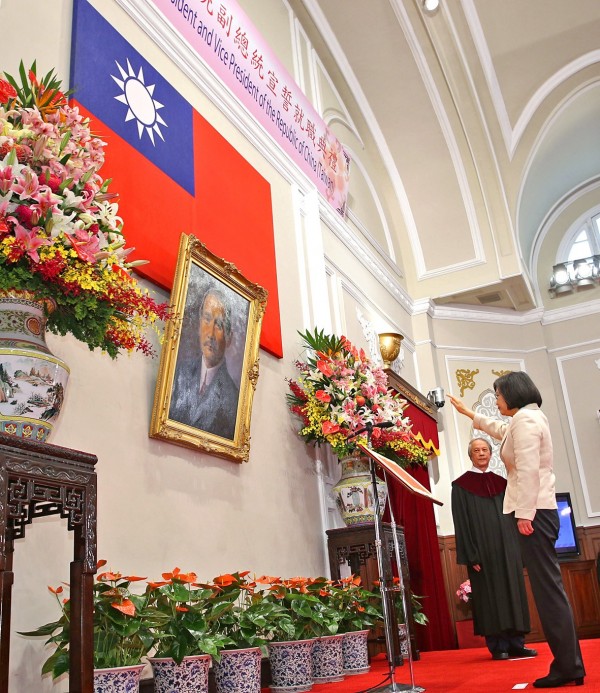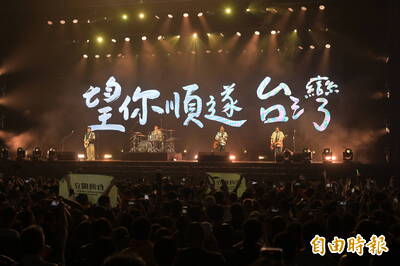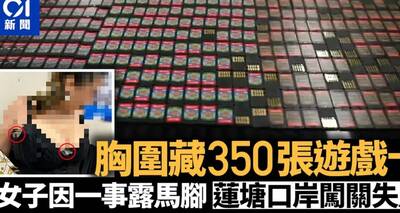《TAIPEI TIMES 焦點》 Tsai’s inauguration speech ‘incomplete test paper’: Beijing

President Tsai Ing-wen, right, is sworn in at the Presidential Office Building in Taipei yesterday. Photo: Liu Hsin-de, Taipei Times
/ Staff writer, with CNA and AFP
China yesterday expressed its dissatisfaction with President Tsai Ing-wen’s (蔡英文) inaugural address, describing it as an “incomplete test paper.”
China’s Taiwan Affairs Office issued a statement in response to Tsai’s speech, in which many people were looking for clues about the future of Taiwan-China ties.
China said it noticed that the “new leader of the Taiwan authorities” mentioned that in 1992, the two institutions representing the two sides of the Taiwan Strait arrived at various joint acknowledgments and understandings through communication and negotiations.
Tsai also said her new government would continue to promote the stable and peaceful development of cross-strait relations based on existing realities and political foundations, the statement said.
However, Tsai did not clearly recognize the so-called “1992 consensus” nor agree to its core meaning, and she did not propose concrete ways to guarantee the stable and peaceful development of the cross-strait relationship, it said.
“On the fundamental question of the nature of cross-strait relations that people on the two sides of the Strait are most concerned about, [Tsai] adopted a murky attitude,” the statement said.
“This is an incomplete test paper,” it said.
Cross-strait exchanges have slowed since Tsai and the Democratic Progressive Party (DPP) scored resounding victories in presidential and legislative elections on Jan. 16, achieving a complete transformation of power in Taiwan.
Tsai has refused to accept the “1992 consensus,” seen by the government of former president Ma Ying-jeou (馬英九) as a tacit agreement between the two sides of the Strait that there is only “one China,” with the two sides free to interpret what that means.
Official Chinese news outlets largely snubbed Tsai’s inauguration, with searches of her name and “Taiwan” blocked on social media.
China’s state-run media were almost mute about the inauguration, with no coverage at all on national TV or major newspapers, such as the People’s Daily, the Chinese Communist Party’s mouthpiece. Xinhua news agency took nearly three hours from when she was sworn in to report the fact in a 22-word dispatch in English.
For several hours, searches for “Taiwan” or “Tsai Ing-wen” on Chinese microblogging site Sina Weibo both returned the message: “Sorry, no relevant result is found,” although her name was later unblocked.
In an editorial, the Global Times — a newspaper owned by the People’s Daily group that often takes a nationalistic tone — said Tsai’s assumption of power heralded “a new era for a cross-strait region that is characterized by uncertainty.”
DPP rule will make Taiwan “take a larger step away from the mainland politically,” it said. “Certain people are still holding on to the fantasy that ‘soft independence’ might be workable.”
“Perhaps a new round of contention is inevitable to completely drive the topic of Taiwan independence away,” it added.
Beijing has been sending assertive messages across the Taiwan Strait since Tsai was elected. It has warned against any attempt to formally declare independence and the Chinese military has mounted at least three landing exercises in the country’s southeast this month — widely seen as a threat to Tsai not to rock the boat.
新聞來源:TAIPEI TIMES



















